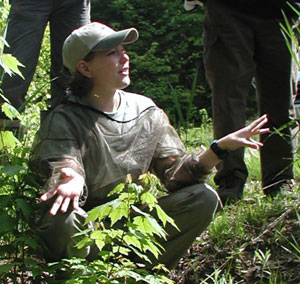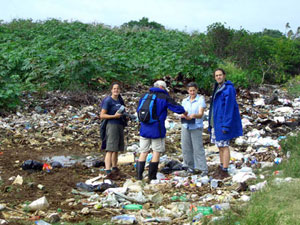Ecologist
Tasks & duties

Ecologists may do some or all of the following:
-
study, monitor and work to protect ecosystems (plants and animals within their environments)
-
work to protect native wildlife, plants and ecosystems
-
monitor ongoing animal behaviour and breeding patterns
-
model the potential effect of introducing a new species to habitats
-
provide advice on coastal and marine ecological matters
-
develop plans to help increase numbers of threatened species, using measures such as predator control
-
publish the findings of their research
-
present research findings at conferences and public meetings to help people to understand ecological issues
At the technician level, the main tasks are to help scientists prepare and carry out a range of experiments and tests.
Skills & knowledge

Ecologists need to have:
-
knowledge of ecosystems and the interaction between species
-
knowledge of natural history
-
knowledge of environmental issues and the climate
-
research skills
-
skill in analysing and interpreting research results and other information
-
practical skills for performing experiments and operating scientific equipment
-
problem-solving skills
-
planning and organisational skills
-
communication skills
-
writing skills, for writing reports and publications
-
maths and computer skills
Entry requirements
To become an ecologist you usually need a Masters degree in ecology or a related area such as botany or zoology. A PhD is generally required for research-based positions.
At the technician level, a Bachelor’s degree in a related science subject is the minimum entry requirement.
Secondary education
A tertiary entrance qualification is required to enter tertiary training. Bursary or NCEA equivalent biology, chemistry, and maths with statistics are necessary subjects. Geography and English are useful subjects.
Training on the job
Ecologists gain or refine skills on the job, and attend conferences and courses to improve their knowledge.
Ecologists working at the technician level often study for a Master's or PhD degree while working. They are also mentored by the scientists whose projects they are working on. This helps them gain practical skills for carrying out specific experiments.
Useful experience
Experience in working as a technician while doing summer placements during Masters study is very valuable. Working as a volunteer in ecology and conservation is also useful. Experience driving four-wheel-drive and all-terrain vehicles may also be useful when in the field.
Related courses
Biochemistry and Cell Biology
Botany
Soil Science
For more information, please refer to Career Services.
Document Actions
